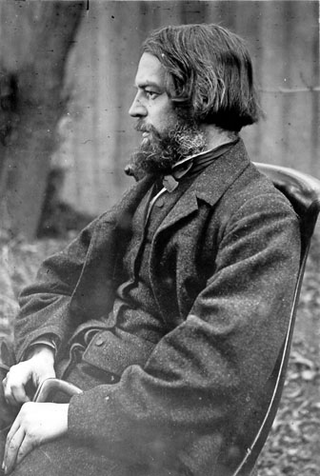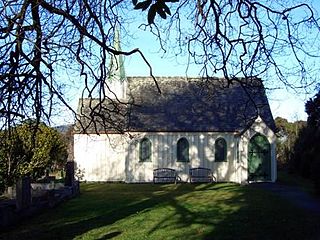
Fendalton is a suburb of Christchurch, in the South Island of New Zealand.

The Wellington Cathedral of St Paul, also called St Paul's Cathedral or Wellington Cathedral, is an Anglican cathedral church located on Hill Street, at its junction with Molesworth Street, in Thorndon, in the city of Wellington, New Zealand. It is situated close to the parliament precinct.

Holy Trinity Cathedral is an Anglican cathedral situated in Parnell, a residential suburb of Auckland, New Zealand. It is the 'mother church' of the Anglican Diocese of Auckland and the seat of the Bishop of Auckland. The current main church building was consecrated in 1973.

The Diocese of Christchurch is one of the thirteen dioceses and hui amorangi of the Anglican Church in Aotearoa, New Zealand and Polynesia. The Diocese covers the area between the Conway River and the Waitaki River in the South Island of New Zealand.

Benjamin Woolfield Mountfort was an English emigrant to New Zealand, where he became one of the country's most prominent 19th-century architects. He was instrumental in shaping the city of Christchurch's unique architectural identity and culture, and was appointed the first official Provincial Architect of the developing province of Canterbury. Heavily influenced by the Anglo-Catholic philosophy behind early Victorian architecture, he is credited with importing the Gothic revival style to New Zealand. His Gothic designs constructed in both wood and stone in the province are considered unique to New Zealand. Today, he is considered the founding architect of the province of Canterbury.

St Barnabas' Church is a heritage listed Anglican church, located at 266 Coast Road, Warrington, Otago, New Zealand. The small wooden church was built in 1872.
Architecture of New Zealand is the built environment of regions, cities and towns of New Zealand.

The Christchurch City Council is the local government authority for Christchurch in New Zealand. It is a territorial authority elected to represent the 396,200 people of Christchurch. Since October 2022, the Mayor of Christchurch is Phil Mauger, who succeeded after the retirement of Lianne Dalziel. The council currently consists of 16 councillors elected from sixteen wards, and is presided over by the mayor, who is elected at large. The number of elected members and ward boundaries changed prior to the 2016 election.

Woodend is a town in the Waimakariri District, in the Canterbury Region of the South Island of New Zealand. It may have been named because it was on the edge of what was then called the Maori Bush, or after an early settler, Thomas Wooding. It is situated with both the Waimakariri and Ashley / Rakahuri Rivers running either side. Woodend is 6.6 kilometres north of Kaiapoi and 6.3 kilometres to the east of Rangiora. Woodend is within walking distance of the town of Pegasus.

St Paul's Church is an historic Anglican church, located on Symonds Street near the University of Auckland and Auckland University of Technology, in the central business district of Auckland, New Zealand. The church is the longest established parish in the city and has one of the largest Anglican congregations in Australasia.

Upper Riccarton is a suburb of Christchurch. It is due west of Riccarton.

Mona Vale, with its homestead formerly known as Karewa, is a public park of 4 ha in the Christchurch suburb of Fendalton. The homestead and gate house are both listed as heritage buildings with Heritage New Zealand (NZHPT). The fernery and the rose garden, and pavilion with the setting of the park along the Avon River, add to the attractiveness of the property. It is one of the major tourist attractions of Christchurch.

The Church of St Michael and All Angels is an Anglican church located at 84 Oxford Terrace, Christchurch, New Zealand.

Cecil Walter Wood was a New Zealand architect. He was the dominant architect in Canterbury during the interwar period.

St Saviour's at Holy Trinity is an Anglican church in Lyttelton, Christchurch, New Zealand. St Saviour's Chapel was relocated from West Lyttelton to Christchurch's Cathedral Grammar School in the 1970s. Following the earthquakes and the demolition of Holy Trinity Church, Lyttelton, St Saviour's was returned to Lyttelton to the site of Holy Trinity in 2013.

The Cardboard Cathedral, formally called the Transitional Cathedral, in Christchurch, New Zealand, is the transitional pro-cathedral of the Anglican Diocese of Christchurch, replacing ChristChurch Cathedral, which was significantly damaged in the 2011 Christchurch earthquake. The Cardboard Cathedral was designed by the Japanese architect Shigeru Ban and opened in August 2013. It is located on the site of the former St John the Baptist Church on the corner of Hereford and Madras Streets in Latimer Square, several blocks from the permanent location of ChristChurch Cathedral.

St John's Church, Hororata also known as St John's Memorial Church and the Hororata Memorial Church is a former Anglican church located on Scotts Road, Hororata, New Zealand.

All Saints' Church, also known as Hokitika Anglican Church, is an heritage-listed Anglican church located in Hokitika, on the West Coast of the South Island of New Zealand. The church forms part of the Ross and South Westland parish of the Diocese of Christchurch within the Anglican Church in Aotearoa, New Zealand and Polynesia. The church building is a Category I building on the Heritage New Zealand register.

Leonard Roy Lovell-Smith was a New Zealand architect.

St Peter's Church is an Anglican church in Riccarton, Christchurch, New Zealand. It is registered as Category II by Heritage New Zealand.






















